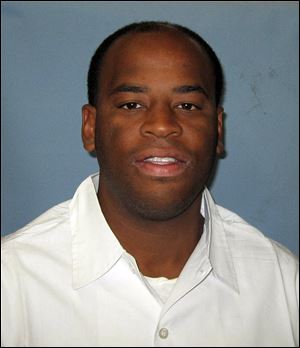
Continuing busy execution week in US, Ala. puts killer to death for store clerk's '94 slaying
9/22/2011
Death row inmate Derrick O'Neal Mason is seen in an undated photo provided by the Alabama Department of Corrections.
ATMORE, Ala.— A man described by a police informant as trying to make a name for himself was executed Thursday evening for the 1994 shooting death of an Alabama store clerk during a robbery.
Derrick O. Mason, 37, was administered an injection and pronounced dead minutes later at 6:49 p.m. local time at Alabama's Holman Prison. It was the third execution this week in the United States.
Strapped to the gurney, Mason gave a brief statement, apologizing to the victim's family "for the hurt and pain I caused" them. He thanked the victim's father for getting in touch years ago and granting him his forgiveness.
Just before the chemicals began coursingthrough the veins in Mason's arm, a prison chaplain held his hand and kneeled and said a prayer before stepping back.
Mason's breathing slowed, his head tilted backward and his lips pursed several times before he became very still. Minutes later, authorities closed the curtain on the death chamber.
During the execution, the condemned man's mother, Maggie Mason, sat in the front row with her head bowed down. "He's resting for the first time," she said repeatedly. Later she held the hands of some other family members present and said: "He's gone."
The victim's family issued a statement afterward saying it hopes the execution stands as a deterrent for those who consider committing heinous crimes.
"We sincerely wish he had made a different decision ... then neither of our families would have been here tonight," said the family of victim Angela Cagle.
Mason was convicted of killing the 25-year-old woman in Huntsville on March 27, 1994, shooting her twice in the face at close range after ordering Cagle to take her clothes off during an early morning robbery. The victim was found dead in the back room of the convenience store where she worked.
An unidentified man later told police that Mason had committed the crime. The informant described the gun used, told police that Mason was "out of control" and "trying to make a name for himself," and then led authorities to Mason's car. Inside, police found a gun later determined to be the murder weapon. After he was arrested, Mason confessed, court records show.
Mason's execution capped a busy week in U.S. death chambers.
Georgia on Wednesday put Troy Davis to death for the 1989 death of a policeman, despite an international outcry and claims he was innocent. In Texas, officials executed a white supremacist who dragged to death James Byrd Jr., a black man from East Texas.
Mason also was the fifth person executed in Alabama this year and the third to die since the state changed the first drug used in its execution cocktail from sodium thiopental to pentobarbital. The change follows a nationwide shortage of sodium thiopental.
Over the years, Mason argued that his Constitutional rights were violated because he was initially arrested on an unrelated misdemeanor assault warrant and therefore the gun found in his car should not have been admitted into evidence in the murder case. He also argued that his confession was involuntary because he was subjected to improper questioning, intoxicated and hungry during the interrogation, psychologically coerced, and misled by law enforcement officers.
Mason alleged that police interrogators grabbed him, pinned him down to his chair, and forced him to look at photographs, court records show. Appellate courts were not swayed by the arguments.
Mason had exhausted appeals Thursday, including an 11th-hour bid before the U.S. Supreme Court.